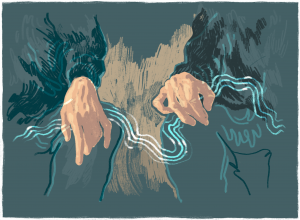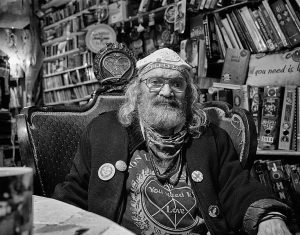The First Last Words of Fyodor Dostoevsky
by Thomas Greany | February 9, 2024
“ ‘It was just a minute before the execution,’ began the prince, readily, carried away by the recollection and evidently forgetting everything else in a moment, ‘just at the instant when he stepped off the ladder on to the scaffold. He happened to look in my direction: I saw his eyes and understood all, at once.”
Fyodor Dostoevsky, one of the most celebrated novelists in Russia’s rich literary history, died twice. He was afforded this rare experience on the 22nd of December 1849, when he stood before a firing squad in St. Petersburg square, convinced that the words and images flickering before his vision would soon be obliterated by the fierce, plosive gunshot of a Tsarist militant. In his notebooks and novels Dostoevsky describes this event as a first death, a moment so profoundly disconnected from the steady narrative of his writerly existence as to have transformed his worldview. Of course, that worldview was the very reason for his standing before the firing squad: Dostoevsky had been convicted of crimes relating to the circulation of seditious journalism as part of the Petrashevsky circle, a group of intellectuals thought to have been conspiring against the Tsar.
And yet, he was saved. His terrified mutterings of the five minutes before his execution became his first, last words. Moments before the gunshot was to sound, a messenger arrived at the square and informed the convicts that the Tsar had decided to show them mercy; they were released and sent to serve in Siberian labour camps for four years. But the events of that day were not easily forgotten by Dostoevsky. In his later novels this ‘first death’ is linked to what might be seen as an aesthetic rebirth, with important ethical implications. Does our experience of beauty change when our perception is framed by the knowledge of mortality? What about our moral obligations, are those affected by this access to a new aesthetic world? And finally, what draws the dividing line between the salvation proffered by the Tsar and that given by Dostoevsky’s God, a subject of profound importance in his later novels? Faced with these myriad questions, Dostoevsky became uncomfortable with mediocrity, always attempting to imitate that bright moment of inspiration before the firing squad. But when his last words did sound, they smacked of normalcy – if not mediocrity. Those words, proffered to his wife on the 9th of February 1881 were, “I loved you and did not cheat on you once, not even in my thoughts.”.
On a dusty shelf spattered with turquoise paint lay a steadily decaying copy of Dostoevsky’s The Idiot. The intellectual ineptitude of my fourteen-year-old mind led me with frightening haste to the conclusion that this was a satirical novel, most likely written by a pseudonymous ‘Idiot’ and titled, quite absurdly, Dostoevsky. What a laugh. But in my belief that the author of this tattered, 1954 penguin paperback took ‘The Idiot’ as his name, I was making a naïve mistake not altogether unlike those characteristic of the novel’s protagonist. Prince Myshkin, described in one of Dostoevsky’s notebooks as a “perfectly beautiful man,” is The Idiot in question. He is a sometime Christ-like figure, yet one whose kindness and meekness is often challenged by an unanticipated human failing. He possesses angelic features, but is weak and epileptic (as was Dostoevsky); he is almost unconditionally pleasant and yet, at points in the novel, terribly spiteful. He has a kind of purity which would seem to elevate him above romance, but he finds himself, by the end of the first chapter, inexplicably besotted with the unsympathetic Nastasya Flipovna. He is, like Christ, a kind of uncontainable divinity trapped in the deeply unsettling corporeal world of his body. This tension underpins Dostoevsky’s novel, haunting every page, transforming the text into a physical container for something that almost certainly transcends it. That is, until Myshkin reveals a fragment of a story well known to Dostoevsky, about an execution whose every detail reminds us of that experience before the firing squad in 1849. Here, in this story, the tragedy of The Idiot aligns with the tragedy of Dostoevksy’s life, and that famous thesis—that “beauty will save the world”—echoes in the silence before the inevitable and impossible gunshot sounds.
An epileptic, Myshkin returns to his native St. Petersburg after years of treatment in Europe at the beginning of the novel. His arrival, in the eyes of former Archbishop of Canterbury Rowan Williams, author of Dostoevsky: Language, Faith, and Fiction, almost mimics a New Testament image of Christ’s arrival at Jerusalem. This is certainly an intentional stylistic parallel: Dostoevsky’s protagonist is a Christ-like figure, whose physical and psychological traits partake in a Russian Orthodox iconographic tradition. He is meek, kind, emotionally perceptive. And yet, quite paradoxically, he is despised by nearly everyone he meets. Dostoevsky’s Idiot is an extraordinarily challenging character study, incessantly asking that the reader see him as the Second Coming whilst simultaneously requiring that they put aside his every human failing.
In the fifth chapter of the novel, Myshkin finds himself at the home of a distant relation and fills an awkward silence with a story of the aforementioned execution. As is the case with many of Dostoevsky’s protagonists, Myshkin is primarily preoccupied by the workings of his subject’s mind as it collides inelegantly with the structures and strictures of the outside world. He tracks the executee’s path to the gallows, imagining “that various thoughts must beat loud and fast through his head—all unfinished ones, and strange, funny thoughts, very likely!”. Myshkin is also transfixed by the image of a cross held up to the convict by an officiating priest: “The priest is holding the cross to his blue lips, and the criminal kisses it, and knows and sees and understands everything.”. These ‘blue lips’ signal the authority of death, but at the moment that the criminal “understands everything”, does he not transcend the mortal symbolism of that crucifix? The passage would seem to suggest so. After all, Myshkin’s assertion—quoted at the beginning of the article—that when the criminal turned to him, he “understood all, at once” is remarkably similar to the moment in which the criminal “sees and understands everything.”. Dostoevsky, Myshkin, and the criminal seem to be joined in this moment by a strong mutual comprehension which would seem to outdo the finitude of death. But this criminal is not saved. His kissing the cross offered to him by the priest does not negate the reality of human mortality, and this is something which separates him from Dostoevsky. For in 1849 Dostoevsky said his prayers and they were met with human mercy. Perhaps he is convinced, then, that this mercy is inadequate, that in answering human prayers God belittles himself. For in the remaining chapters of The Idiot, Dostoevsky doubts again and again the capacity of the human to emulate the divine. Myshkin, by the end of the novel, might even be seen as a delusional antichrist. But maybe he is no Idiot – perhaps he shares the status of the author whose name is printed on the very same book cover. Perhaps, Myshkin does have access to a higher form of beauty in the same way that the criminal might, having been told that there are “about five minutes of time left for him to live.”. Surely we will never know: the criminal is executed, and Myshkin soon regresses into the murmuring incomprehensibility of madness. But then again, the book of Dostoevsky’s life is also firmly closed.
The former archbishop of Canterbury, Rowan Williams, has professed a lifelong passion for the works of Dostoevsky. In 2008 he published Dostoevsky: Language, Faith, Fiction, and in a subsequent interview, he stressed Dostoevsky’s “particularly Russian emphasis on the humility, and even the humiliation of God.” According to Williams, Dostoevsky demonstrates an odd conviction in his novels: that “as a Christian, he could put the case against God even more strongly than an atheist could.” The Idiot is a testimony to this belief on Dostoevsky’s part, in that it places a much revered Christian narrative—one in which Christ is misunderstood and eventually sentenced to death—in parallel with its satiric counterpart, in which a kind hearted Russian man with epilepsy is misunderstood and eventually regresses into madness. At the microcosmic level, this dynamic is evident in the story of the firing squad. The prisoner, knowing that he must die, begins to experience the world in what we, the reader, are convinced is an elevated sense. In any case, unless we are sentenced to death, we cannot access the lens through which Dostoevsky’s prisoner sees. However, in other discussions throughout The Idiot, Dostoevsky draws a line between the salvation experienced by prisoners who, like himself, are saved by a political agent such as the Tsar, and truly saintly figures, who he sees as having been saved by God. Whereas the prisoner experiences a brief moment of joy in the moments after they are saved, the saint, having experienced truly divine beauty, is changed for life. To answer a few of the questions posed above, then, it seems that Dostoevsky is in awe of these moments of divine likeness, in which an author, or a firing squad, can create an illusion of divine presence; but he does not believe that these moments will shift our moral convictions into another realm. Before the firing squad, before the pages of one of Dostoevsky’s novels, we are given the space to ask thoroughly human, existential questions, but we never even catch a glimpse of the divine.
Someone once told me that there is no such thing as existentialism, the philosophical movement within which Dostoevsky is often categorised. As much as the work of French philosopher Sartre in Existentialism as a Humanism would indicate the opposite, perhaps this someone had a point. For although Simone de Beauvoir and Kierkegaard, the Russian author’s fellow ‘existentialists’, seem often to invoke the same principles as Dostoevsky and Sartre, existentialism’s emphasis on the individual makes drawing a line through the history of an ‘existentialist philosophy’ rather difficult. The embodied identity of the human is central to all of these thinkers, and particularly to Dostoevsky. In fact, if they all sat down to bowls of borscht at the Russian author’s heavenly abode, they would no doubt agree with his authorial decision to leave questions of an aesthetic salvation unanswered. But for a moment in 1849, Dostoevsky was not in the comfortable position of being able to hypothesise about the aesthetic implications of standing before a firing squad. He was right there. As Myshkin admits, neither the convict in The Idiot nor its author “could hardly have had any connected religious thoughts” in the moments before their imagined execution. But although this may be the case, Dostoevsky did have thirty-two more years after his mock execution to have “connected religious thoughts.” Unlike Myshkin, Dostoevsky did not fade into obscurity and madness. Instead, he produced reams of reflections upon the questions that make one mad. And in doing so, he established a special space for himself in between the divine and the human which might, quite simply, be called art. ∎
Words by Thomas Greany. Art by Angelika Woodruff.




